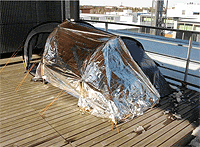Strategy seminar of the Department 2014
The strategy seminar for the Department of Computer Science was arranged at the Kisakallio sports institute in Lohja on 26-27 May 2014. In addition to the strategy work, the programme included meals and coffees, sports, and sauna baths. The high winds blew frisbees and canoes into the bushes. However, the water in Lake Lohjanjärvi was warm, some 20 degrees according to the skin thermometer. The seminar was attended by 73, and Esko also visited to partake of the supper in good company.
The theme for this year’s seminar was the planning of a Department vision and strategy for year 2020. The work will serve as a basis for the development, starting next year, of the 2017-2020 strategy for the University of Helsinki, along with the target programmes and plans of action to implement it. As per usual, the work was carried out in workshops, which were this time formed according to staff groupings as follows: professors and assistant professors (chair: Teemu Roos); lecturers and equivalent (Teemu Kerola); post-docs (Leena Salmela); doctoral students (Arto Vihavainen); research assistants and part-time teachers (Juhani Toivonen); administrative staff (Pasi Vettenranta); students (Johannes Verwijnen); foreigners (Jürgen Münch).
Before the strategy seminar itself, the workshops met to consider the Department vision. As a synthesis of the considerations, the following shared vision for the Department in 2020 was produced:
The quality of research and teaching at the Department is internationally high and attracts the best undergraduate (BSc) and graduate (MSc, PhD) students. Two to three research areas are of world class, and two to three are rising towards it. The Department is highly visible in international research communities.
Education at the Department is based on current pedagogical advances in teaching, especially e-learning. The contents of courses are constantly kept in line with the current needs of industry and society. The students are continuously supported in their studies by different modes of life-long learning.
The administration and IT services of the Department are based on understanding the real tasks, needs and motives of the users who also have a significant role in continuous development of the services.
The Department has an active role in interdisciplinary partnerships with strategically selected high-quality departments, especially within the University of Helsinki. The partnerships are founded on the strong research output of the Department. There are effective mechanisms for the start-up activities of researchers.
The Department is an international and collective community, open to new ideas, and different opinions, cultures and people. The best students and researchers are actively recruited nationally and internationally.
During the first seminar day, the workshops in Kisakallio designed strategic measures for making this vision come true. A commendable 80 suggestions were proposed, 10 per workshop. During the second day, these propositions were grouped and ordered according to priority in a joint brainstorming session chaired by the experts (“Builders of Success") from BoMentis Coaching House, Leni Grünbaum and Antti Soikkanen.
As an end product of the brainstorming session, the following most significant strategic measures were devised, ordered into six categories:
- Quality of research and teaching
- Finding the right people and keeping them
- New models for recruitment: 10-year recruitment plan, more tenure-track positions, earlier recruitment to tenure track, flexible recruitment
- Sharing and communication between researchers and teachers: good practices, collaboration
- Stable long-term funding and budgeting
- Education
- Research-based teaching: making links between theory and research done at the Department
- More research orientation to Bachelor studies
- PhD courses: more transparency, less workload
- Student guidance: career-path approach, extra teaching for weaker students
- Administration and IT services
- Research support: IT engineering
- Interfacing with university-level services: info to us about them, influencing them so that they work
- Interdisciplinary partnerships
- Interdisciplinary engagement: research collaboration, teaching to prepare experts able to bridge gaps
- Interdisciplinary study profiles: more diverse minors for students, adjustment of courses to support interdisciplinary degrees
- Start-up know-how support: information sources, contacts with industry
- Contact person and mechanisms to connect with other departments and the industry
- International and collective community
- Information officer (“tiedottaja”): image and community building, channels (media, alumni, foreign staff and students)
- Preparation of easy-to-distribute materials by information officer
- Space [and time] for informal meetings: regular meetings, self-organization, promoting of research to students
- Internal get-togethers: fixed time
- Leadership
- Distributed leadership: bottom-up
- Calculated risk taking: fail fast, don’t punish failures
We will start to put the strategic measures envisioned at the seminar into practice at the Department already before year 2020. The first measure we have embarked upon is to improve the communal spirit of the working community: we have already had two “Perjantai Pullas” at a fixed time, at 2 o’clock on Friday in the 2nd-floor break room. It seems to have gone down well.
Jukka Paakki

 Lots of energy can be saved by using outside air directly for cooling in data centers in the north. In a study by researchers of Helsinki Institute for Information Technology HIIT and the University of Helsinki, computers functioned correctly over extended periods of time when run in harsh winter temperatures. Commercial, off-the-shelf computers ran well even when the outside temperature was -22C (-8F).
Lots of energy can be saved by using outside air directly for cooling in data centers in the north. In a study by researchers of Helsinki Institute for Information Technology HIIT and the University of Helsinki, computers functioned correctly over extended periods of time when run in harsh winter temperatures. Commercial, off-the-shelf computers ran well even when the outside temperature was -22C (-8F).